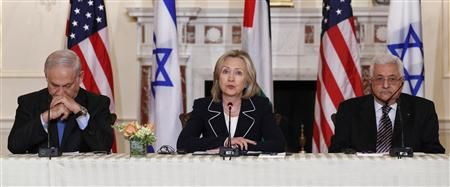Tense meeting anticipated at White House

Tense meeting anticipated at White House
Some prominent Israeli reporters who are accompanying the Isreali Prime Minister Benjamin Netanyahu on his trip to Washington, has predicted a stormy meeting between him and the US President. Netanyahu and Obama are scheduled for talks at the White House on Friday.
Earlier, Netanyahu had vehemently rejected Obama's proposal for a two-state solution between Israel and Palestine. Obama had said in a major speech to the state department ahead of his Israeli counterpart's visit, that a future Palestinian state must be based on the 1967 borders.
Although this is a clear indication that Washington expects Jerusalem to forgo some of the major settlement blocs, it will mean the pulling back of an estimated 300, 000 Israeli people who live outside those borders.
The United States had always backed such a policy but Obama is the first American President to bluntly endorse it. While Obama has supported his idea by calling for swaps mutually agreeable for Palestine and Israel, Netanyahu retorted strongly in an official statement by saying that, drawing the borders on the 1967 lines will jeopardize his nation's security. He claimed that pulling back to the earlier lines could leave Israel 'indefensible'.
Netanyahu had long maintained that Israel will never be willing to cede the Jordan valley and that it will keep military presence in the eastern west bank even after the possible establishment of a Palestinian state. One of the arguments was that, such a strong measure was imperative to the prevention of smuggling of arms into the prospective Palestinian state.
Also, he had often referred to the firing of missiles by the Palestinian militants into the Israeli territory after Israel's unilateral pullout in 2005. Understandably, the Palestinian authorities had always voiced its strong protest over his stand.
By the blunt language used by the US President in his address, and later the openness with which Netanyahu responded to it, it is now clear that ending Israel's occupation in Palestine will be the core issue to be discussed on Friday.
Obama, who said ''The dream of a Jewish and democratic state cannot be fulfilled with permanent occupation'', went on to suggest that other issues like returning Palestinian refugees and the issue of Jerusalem can be reserved for future meetings.
© Copyright IBTimes 2025. All rights reserved.





















